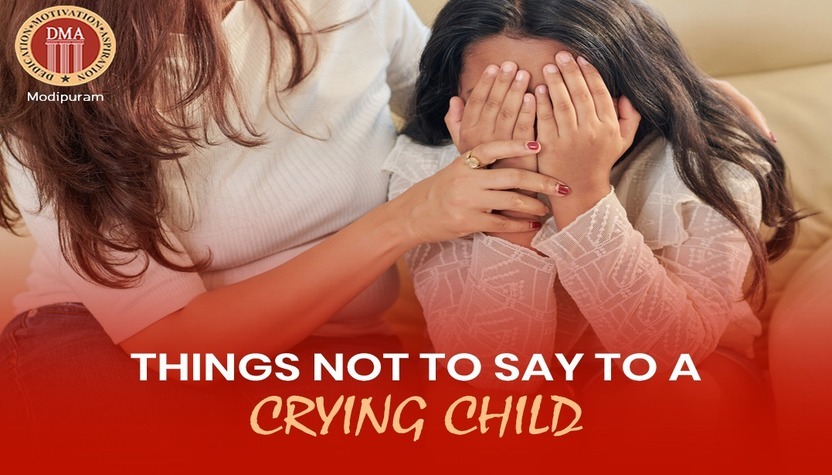One of the greatest joys and challenges of life is being a parent. As a parent, you bear the responsibility of ensuring that your child is not just provided with quality education but is also infused with morals, ethics, values, and crucial life skills. However, it often happens that despite all your efforts, you find your children gradually getting disconnected from you.
What do you think is the reason for that? Well, while the generation gap has its own role to play, the differences mostly arise because of the little things you miss giving enough importance to! For instance, what do you do when your child begins throwing tantrums or crying? Do you try to get your child in control with power, anger, and force? Do you end up saying hurtful things to them? If yes, you are committing a huge mistake here! After all, words are powerful tools that can shape how your child perceives themselves.
So here, in this article today, we at Dayawati Modi Academy, one of the top 10 CBSE schools in Meerut, will share with you a few suggestions on what NOT to say when your child is breaking down over an issue, no matter how minor or major it seems.
- “Stop Crying Now; Nothing Has Happened!”
While it may be difficult for you, as a parent, to see your child cry, it’s essential to remember that telling them to stop can give the message that they are wrong for feeling how they feel. This only discourages them from being honest about their emotions and ultimately leads to emotional blockage in the long run.
It’s always better to gently ask, “What’s the matter? Why are you crying?” as this will create an environment of understanding where your child feels free to open up to you.
- “Big Boys/Girls Don’t Cry!”
We all want our children to grow into strong, independent, and resilient individuals capable of overcoming difficulties. However, how we impart this message is just as important as the outcome.
Instead of telling your children that ‘big boys/girls don’t cry’ when they face something difficult, offer to help them find a solution. You can show them how to tackle issues with poise and objectivity.
This will ultimately lead them to become more self-dependent and lay out a secure platform for their future successes.
- “Don’t Cry Over Silly Things!”
We at Dayawati Modi Academy understand that finding proper ways to respond to your child’s emotional outbursts can be difficult for you as a parent. However, trust us when we say that empathy, understanding, and resilience can work as a magical wand in getting the situation under control. We recommend that instead of asking, “Why are you crying over such a silly thing?” try saying something like, “I can see this is hard for you. Would you like to talk more about it?”
Demonstrating that their feelings are noticed and respected will bring comfort and help them recognize the potential silver linings in any situation.
- “If You Stop Crying, I’ll Give You Sweets!”
It is understandable for parents to be at their wits’ end when their child is crying uncontrollably. However, using threatening words or offering rewards to make a child stop can have negative repercussions.
A better solution would be taking a break instead. By walking away from the situation and giving the little one some space, he/she will understand that it is alright to step back and collect himself/herself before continuing with whatever it was you were doing together.
Offer supportive words while finding alternative ways to engage him once he has calmed down, as this can make all the difference.
- “Shh! Everyone is Looking at You!”
Having the ability to self-regulate emotions is a skill children need to learn from an early age. While it’s fair for parents to wish their kids to behave in public, telling them it’s embarrassing to make a scene will simply limit and suppress their feelings, resulting in long-term effects.
It’s essential that parents fully acknowledge their child’s emotions, even when it involves tears and tantrums. If done right, this kind of empathetic response can help with conflict resolution and teach healthy emotion regulation skills.
Finally…
Everyone makes mistakes, but it’s important to always review our reactions in order to keep things positive and constructive.
We at Dayawati Modi Academy, ranked among the top 10 CBSE schools in Meerut, firmly believe that being aware and mindful of the choices made in the language that you are choosing to use with the child is crucial. Positive communication, even in challenging times like these, goes a long way in setting up healthy, supportive environments for children to thrive both emotionally and mentally.

